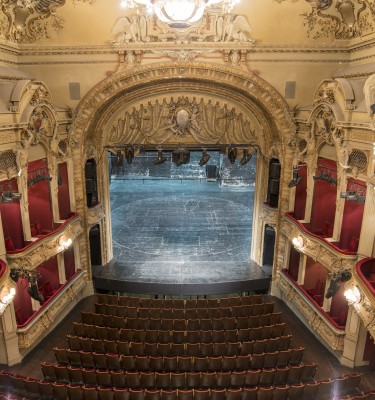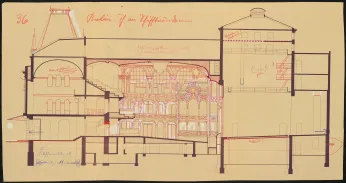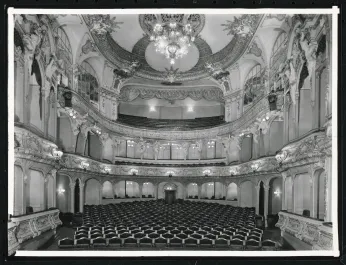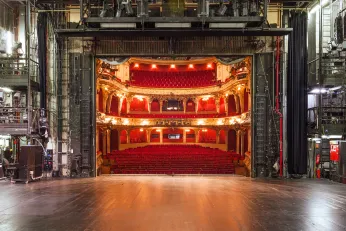1892 The Theater am Schiffbauerdamm, a neo-baroque building by architect Heinrich Seeling, is opened with a performance of “Iphigenie auf Tauris (Iphigeneia in Tauris)” by Johann Wolfgang von Goethe.
1893 World premiere of “Die Weber (The Weavers)” by Gerhart Hauptmann, directed by Otto Brahm.
1903-1906 The theatre is headed by artistic director Max Reinhardt, whose fame is based on his 1905 production of Shakespeare’s “A Midsummer Night’s Dream”, with music composed by Felix Mendelssohn Bartholdy specifically for this purpose.
1906-1925 The theatre is used as an entertainment or operetta theatre under various names – such as “Montis Operettentheater” or “Neues Operettentheater” – and changing artistic directors, until it becomes the Volksbühne’s second venue from 1926 to 1928.
1928-1931 Ernst Josef Aufricht becomes artistic director and launches his tenure in 1928 with the world premiere of “Die Dreigroschenoper (The Threepenny Opera)” by Bertolt Brecht and Kurt Weill, directed by Erich Engel. The production becomes the greatest theatrical success of the Weimar Republic.
From 1933, the theatre serves the ideological purposes of the Nazi regime.
1938 The Nazis force the Jewish Saloschin family to sell the property. Kurt Wertheim purchases it, only to be persecuted in turn soon afterwards.
1945-1953 After having been used as an entertainment theatre from 1931 to 1944, it is reopened in 1945 under Rudolf Platte, followed by the artistic direction of Fritz Wisten in 1946, until the latter is able to move into the reconstructed Volksbühne am Rosa-Luxemburg-Platz in 1954.
1954 The Berliner Ensemble moves from Deutsches Theater into its own venue and renames the theatre Berliner Ensemble. Helene Weigel becomes general director, Brecht carries the artistic responsibility.
1954 The logo, created on the basis of a design by Peter Palitzsch, is installed on the theatre’s roof. Pablo Picasso’s dove of peace, which had already been mounted in front of the curtain at Deutsches Theater, becomes the emblem of the new house, too.
1954 The extended revolving stage now runs on 32 wheels of a Soviet T-34 tank, which Helene Weigel has talked the Soviet occupying forces into supplying.
1954 The Berliner Ensemble opens with Brecht’s adaptation of Molière’s “Don Juan”, directed by Benno Besson and featuring Erwin Geschonnek and Ekkehard Schall.
1954 The Ensemble undertakes its first tour to Paris with “Mutter Courage und ihre Kinder (Mother Courage and her Children)”. At the “Theatre Festival of Nations”, it receives first prizes for Best Play and Best Production.
1954 At the premiere of „Der kaukasische Kreidekreis (The Caucasian Chalk Circle)”, written and directed by Bertolt Brecht, designed by Karl von Appen and featuring Helene Weigel and Ernst Busch, the company is called out for 52 curtains and 4 additional ovations in front of the iron curtain.
1956 Brecht dies and is buried on Dorotheenstädtischer Friedhof, according to his wishes.
1957 Premiere of “Leben des Galilei (Life of Galileo)” by Brecht, directed by Erich Engel and Brecht, featuring Ernst Busch.
1958 The 175th and final performance of “Der kaukasische Kreidekreis (The Caucasian Chalk Circle)” featuring Helene Weigel.
1959 Premiere of “Der aufhaltsame Aufstieg des Arturo Ui (The Resistible Rise of Arturo Ui)” by Bertolt Brecht, directed by Peter Palitzsch and Manfred Wekwerth, featuring Ekkehard Schall.
1960 Premiere of “Die Dreigroschenoper (The Threepenny Opera)” by Bertolt Brecht and Kurt Weill, designed by Karl von Appen and directed – as was the world premiere in 1928 – by Erich Engel. Brecht’s “Mutter Courage und ihre Kinder (Mother Courage and her Children)”, which had been premiered at Deutsches Theater in 1949, directed by Erich Engel and featuring Helene Weigel, continued to run to great success at Berliner Ensemble from 1954.
1961 405th and final performance of “Mutter Courage und ihre Kinder (Mother Courage and her Children)” featuring Helene Weigel.
1963 On the occasion of Brecht’s 65th birthday, the square in front of the Berliner Ensemble is renamed Bertolt-Brecht-Platz.
1964 Premiere of Shakespeare’s “Coriolanus”, directed by Manfred Wekwerth and Joachim Tenschert; the battle scenes are choreographed by Ruth Berghaus.
1971 Helene Weigel dies and is buried next to Brecht.

1971-1977 Ruth Berghaus, who has already been the deputy director since 1970, takes over the theatre’s leadership.
1971 Premiere of Brecht’s play “Im Dickicht der Städte (In the Jungle of the Cities)“, directed by Ruth Berghaus and featuring Ekkehard Schall.
1973 World premiere of “Zement (Cement)” by Heiner Müller, directed by Ruth Berghaus and featuring Martin Flörchinger.
1974 532nd and final performance of “Der aufhaltsame Aufstieg des Arturo Ui (The Resistible Rise of Arturo Ui)” featuring Ekkehard Schall.
1974 New interpretation of Brecht’s initial version of “Die Mutter (The Mother)”, based on Maxim Gorki, by Ruth Berghaus.
1975 Premiere of August Strindberg’s “Miss Julie”, directed by B.K. Tragelehn and Einar Schleef, featuring Jutta Hoffmann.
1977-1991 Following Ruth Berghaus’s coerced resignation, Manfred Wekwerth takes over as head of the Berliner Ensemble, with the support of Brecht’s heirs.
1979 Premiere of “Großer Frieden” by Volker Braun, directed by Manfred Wekwerth and Joachim Tenschert, featuring Ekkehard Schall and Hermann Beyer.
1988 A bronze sculpture of Brecht, created by Fritz Cremer, is installed on the Berliner Ensemble’s forecourt on the occasion of Brecht’s 90th birthday.
1989 A rally for freedom of opinion, expression and the press for artists and culture producers in Berlin, registered by Berliner Ensemble-actor Wolfgang Holz as a co-organiser, turns into the great artists’ demonstration at Alexanderplatz on 4 November. Christa Wolf, Heiner Müller and Stefan Heym are among the speakers.
1991 Senator for Culture Roloff-Momin calls on Manfred Wekwerth to resign.
1992-1995 After several interim solutions, Heiner Müller becomes one of a group of co-artistic directors, including Matthias Langhoff, Fritz Marquardt, Peter Palitzsch and Peter Zadek. After the gradual dissolution of this group, he remains in this position until his death in 1995.
1993 Premiere of “Wessis in Weimar” by Rolf Hochhuth, directed by Einar Schleef, featuring Martin Wuttke and Margarita Broich.
1993 Premiere of “Duell Traktor Fatzer”, a text collage assembled from Brecht’s “Fatzer”-fragments and writings by Heiner Müller, directed by Müller and featuring Eva Mattes, Ekkehard Schall and Hermann Beyer.
1995 Premiere of “Der aufhaltsame Aufstieg des Arturo Ui (The Resistible Rise of Arturo Ui)“ by Brecht, directed by Heiner Müller and featuring Martin Wuttke.
1995 Heiner Müller dies; Martin Wuttke becomes his successor for eight months.
1996 The Ilse-Holzapfel-Stiftung, founded by Rolf Hochhuth, becomes the owner of both the premises and the property of the Berliner Ensemble. Hochhuth came to an agreement with the heirs of Saloschin and Wertheim and purchased both from them. The state of Berlin and the Berliner Ensemble GmbH concluded a thirty-year lease in 1998.
1996 Premiere of “Germania 3 Gespenster am toten Mann (Germania 3 Ghosts at Dead Man)” by Heiner Müller, directed by Martin Wuttke and featuring Volker Spengler.
1999/2000 After a period of rebuilding, Claus Peymann takes over as the theatre’s artistic director and opens with “Die Brecht-Akte” by George Tabori.
2000 Premiere of Shakespeare’s “Richard II.”, in a new translation by Thomas Brasch, directed by Claus Peymann and featuring Michael Mertens. Selected by the French Critic’s Association as best foreign-language theatre production of the year.
2007 Premiere of “Die Dreigroschenoper (The Threepenny Opera)” by Brecht and Weill, directed by Robert Wilson and featuring Jürgen Holtz.
2015 400th performance of “Der aufhaltsame Aufstieg des Arturo Ui (The Resistible Rise of Arturo Ui)” featuring Martin Wuttke.
2017 The season and the new artistic direction of Oliver Reese are launched with “Caligula” by Albert Camus, directed by Antú Romero Nunes and featuring Constanze Becker.
2017 On 19 November, the Theater am Schiffbauerdamm celebrates its 125th anniversary.
This timeline was created by Dr Asja Braune, culture and theatre scholar


